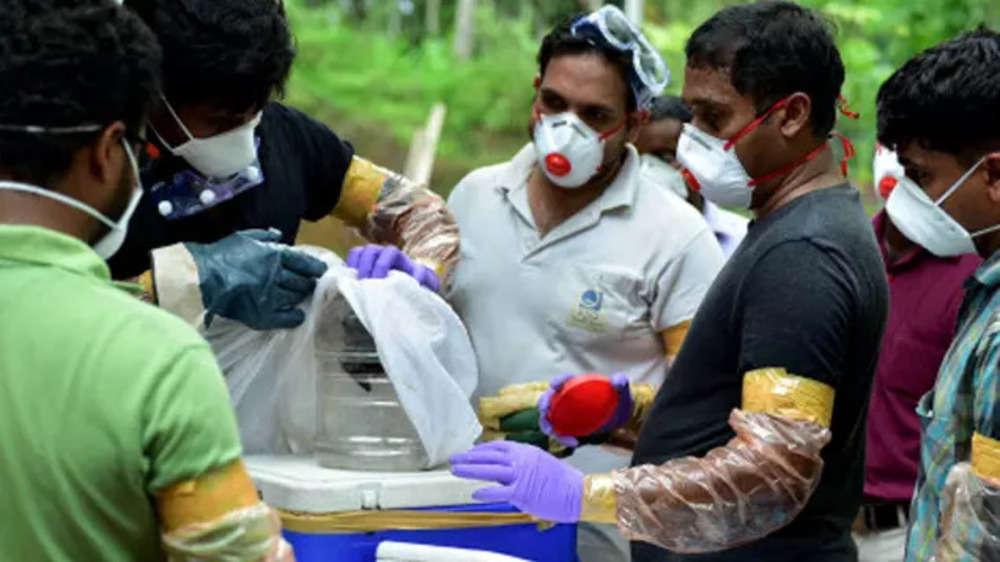Kerala, a state in southern India, closed some schools, offices and public transport on Wednesday to prevent the spread of the rare and deadly Nipah virus, which has already killed two individuals.
A state health official reported that two adults and a child were still infected and that more than 700 people were being tested for the virus, which is transmitted through contact with the bodily secretions of infected bats, pigs, or humans.
According to Reuters, the state government announced that at least 706 individuals, including 153 health care employees, were undergoing testing to prevent the spread of the virus. We awaited the outcome.
Pinarayi Vijayan, the chief minister of Kerala, said in a statement, “More people could be tested…Isolation facilities will be provided.” He requested that no public gatherings take place in the Kozhikode district for the next ten days.
Since August 30, two infected individuals have died in the fourth outbreak of the virus in Kerala since the beginning of 2018, prompting authorities to declare containment zones in at least eight Kozhikode villages.
“We are focusing on early contact tracing and isolating anyone exhibiting symptoms,” state Health Minister Veena George told reporters.
She stated that the virus detected in Kerala was identical to one previously discovered in Bangladesh, a strain that transmits from person to person with a high mortality rate but a history of being less infectious.
She added that state epidemiologists were using antivirals and monoclonal antibodies to treat three infected individuals, including a healthcare worker.
Strict isolation rules have been adopted, with medical personnel being quarantined after contact with the infected.
The first victim was a small landowner in the Kozhikode village of Maruthonkara who grew bananas and areca nuts, according to a government official who retraced the victim’s movements to identify the people he interacted with and the locations he visited before his health began to deteriorate.
The daughter and brother-in-law of the victim, both afflicted, are in an isolation ward while other family members and neighbours undergo testing.
The second fatality occurred after hospital contact with the first victim, according to an initial investigation, but the two were unrelated, said the official, who requested anonymity because he was not authorised to speak with the media.
The Nipah virus was first identified in 1999 during an outbreak of illness among Malaysian and Singaporean pig farmers and others in direct contact with the animals.
Outbreaks are sporadic and previous infections in South Asia have occurred when humans drank date-palm sap contaminated with bat excreta.
The native village of the first victim, Maruthonkara, is located close to a 300-acre forest that is home to numerous bat species. Fruit bats from the same region tested positive for the virus during the 2018 Nipah outbreak.
In Kerala’s initial Nipah outbreak, 21 of the 23 infected individuals perished. Two individuals perished due to epidemics in 2019 and 2021.
The neighbouring state of Tamil Nadu has proclaimed that travellers from Kerala will be subjected to medical examinations and those exhibiting influenza symptoms will be quarantined.
As a result of extensive deforestation and urbanisation, which have brought humans and wildlife into closer contact, parts of Kerala were identified in a May investigation as being among the places worldwide most susceptible to outbreaks of bat viruses.
About the Nipah virus
Nipah virus (NiV) is a zoonotic virus that can cause severe and often fatal infections in humans and animals. It was first identified in 1999 during an outbreak in Malaysia and Singapore. The virus is named after the village of Sungai Nipah in Malaysia, where the outbreak occurred.
Key facts about the Nipah virus:
- Transmission: Nipah virus is primarily transmitted to humans from animals (zoonotic) or through human-to-human transmission. Fruit bats of the Pteropodidae family are considered the natural reservoir hosts of the Nipah virus, and they can be transmitted to humans through direct contact with infected bats or their secretions. Human-to-human transmission occurs through close contact with the bodily fluids of infected individuals.
- Symptoms: Nipah virus infection can lead to various symptoms, including fever, headache, dizziness, drowsiness, mental confusion, and respiratory issues. Severe cases can progress to encephalitis (brain inflammation), leading to coma and death. Some individuals infected with the Nipah virus may also experience acute respiratory distress syndrome (ARDS).
- Outbreaks: Nipah virus outbreaks have occurred in several countries in Southeast Asia and South Asia. Bangladesh and India have experienced multiple outbreaks, with the virus primarily spreading from fruit bats to humans through the consumption of contaminated fruits or contact with infected pigs.
- Prevention: There is no specific antiviral treatment for Nipah virus infection, and management typically involves supportive care. Preventative measures include avoiding contact with sick animals and bats and practicing good hygiene and safe food preparation techniques. Isolation and quarantine measures are also crucial to prevent human-to-human transmission during outbreaks.
- Vaccine: As of my last knowledge update in September 2021, no licensed vaccine was available for the Nipah virus. However, research was ongoing to develop vaccines and antiviral drugs for this virus due to its potential for causing large outbreaks.
Since September 2021, and there may have been developments in Nipah virus research and outbreaks since then. It’s advisable to consult the latest information from health authorities and organizations like the World Health Organization (WHO) for the most up-to-date information on the Nipah virus.
⚠ Article Disclaimer
The above article is sponsored content any opinions expressed in this article are those of the author and not necessarily reflect the views of CTN News






